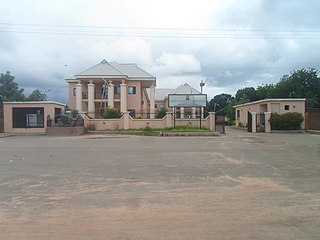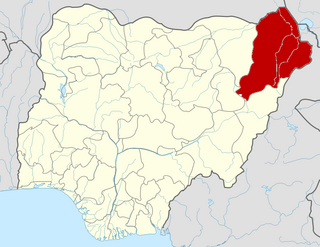
Maiduguri is the capital and the largest city of Borno State in north-eastern Nigeria, on the continent of Africa. The city sits along the seasonal Ngadda River which disappears into the Firki swamps in the areas around Lake Chad. Maiduguri was founded in 1907 as a military outpost by the British Empire during the colonial period. As of 2022, Maiduguri is estimated to have a population of approximately two million people, in the metropolitan area.

Borno State is a state in the North-East geopolitical zone of Nigeria. It is bordered by Yobe to the west for about 421 km, Gombe to the southwest for 93 km, and Adamawa to the south while its eastern border forms part of the national border with Cameroon for about 426 km. Its northern border forms part of the national border with Niger for about 223 km, mostly across the Komadougou-Yobe River, and its northeastern border forms all of the national border with Chad for 85 km. It is the only Nigerian state to border up to three countries. It takes its name from the historic emirate of Borno, with the emirate's old capital of Maiduguri serving as the capital city of Borno State. The state was formed in 1976 when the former North-Eastern State was broken up. It originally included the area that is now Yobe State, which became a distinct state in 1991.

The University of Maiduguri (UNIMAID) is a Federal higher institution located in Maiduguri, the capital city of Borno State in Northeast Nigeria. The university was created by the federal government of Nigeria in 1975, with the intention of its becoming one of the country's principal higher-education institutions. It enrolls about 25,000 students in its combined programs, which include a college of medicine and faculties of agriculture, arts, environmental science, Allied health science, Basic medical science, dentistry, education, engineering, law, management science, pharmacy, science, social science, and veterinary medicine. With the encouragement of the federal government, the university has recently been increasing its research efforts, particularly in the fields of agriculture, medicine and conflict resolution, and expanding the university press. The university is the major higher institution of learning in the north-eastern part of the country.

The Ngadda River is a seasonal river in Nigeria that flows into Lake Chad and the Chad Basin. The Alau Dam built on the river has interfered with fertile seasonal floodplains in the region of Maiduguri.
Damboa is a Local Government Area of Borno State, Nigeria. Its headquarters are in the town of Damboa. It has an area of 6,219 km² and had a population of 233,200 at the 2006 census.
Nganzai is a Local Government Area of Borno State in northeastern Nigeria. Nganzai LGA has an administrative headquarters in Gajiram town with the area council consisting communities and villages of Nganzai, Badu, Alarge, Damaram, Gadai, Kuda, Kurnawa, Maiwa, Miye, Sugundure, Gajiram and Sabsabuwa.

The Boko Haram insurgency began in July 2009, when the militant Islamist and jihadist rebel group Boko Haram started an armed rebellion against the government of Nigeria. The conflict is taking place within the context of long-standing issues of religious violence between Nigeria's Muslim and Christian communities, and the insurgents' ultimate aim is to establish an Islamic state in the region.
The following lists events that happened during 2012 in Nigeria.

On 22 March 2017, at approximately 4:30 a.m, a series of bomb blasts occurred in three locations in the Muna Garage area of Maiduguri, Borno State, northeastern Nigeria. The blasts occurred at the Muna Garage internally displaced persons (IDPs) camp.

Internally displaced person camps in Borno State, Nigeria were centers accommodating Nigerians who had been forced to flee their homes but remain within the country's borders. Displaced persons camps in Maiduguri accommodated from 120,000 to 130,000 people, while those in local government areas ranged above 400,000. There were over two million displaced persons in the state. Internal Displacement Monitoring Centre (IDMC) suggested the figure of internally displaced persons in the state to be 1,434,149, the highest in Northern Nigeria.

Babagana Umara Zulum mni is a Nigerian professor and politician who has served as governor of Borno State since 2019 under the platform of the All Progressives Congress (APC).
Umar Usman Kadafur is a Nigerian politician who has served as deputy governor of Borno State since May 2019.

The Koshebe massacre took place on 28 November 2020 in the village of Koshebe, Nigeria, in Borno State, when as many as 110 civilians and peasant farmers were killed and six were wounded as they worked in rice fields in Koshebe village, near the northeast Nigerian city of Maiduguri. The attack was thought to be carried out by the Boko Haram insurgency. About 15 women were also kidnapped.
The 2023 Borno State gubernatorial election took place on 18 March 2023, to elect the Governor of Borno State, concurrent with elections to the Borno State House of Assembly as well as twenty-seven other gubernatorial elections and elections to all other state houses of assembly. The election—which was postponed from its original 11 March date—was held three weeks after the presidential election and National Assembly elections. Incumbent APC Governor Babagana Umara Zulum has been renominated by his party.
The Mohammed Goni College of Legal and Islamic Studies is a state government higher education institution located in Maiduguri, Borno State, Nigeria. The current Provost is Ali Shettima.

The 2022 Nigeria floods affected many parts of the country. From the Federal Government Data, the floods had displaced over 1.4 million people, killed over 603 people, and injured more than 2,400 people. About 82,035 houses had been damaged, and 332,327 hectares of land had also been affected.
The Alau Dam was situated in the Alau community of Konduga local government area of Borno State in the Northeast region of Nigeria, constructed in 1984–1986. It impounds a major reservoir on the Ngadda River, one of the tributaries of the Lake Chad. In 2024, the dam collapsed, causing catastrophic flooding in Borno State and killing over 150 people, with at least 419,000 people displaced.

The Sanda Kyarimi Park Zoo is a 42-acre zoological garden and wildlife sanctuary located in Maiduguri, Borno State, Nigeria. It is one of the oldest zoological gardens in Nigeria, established in 1970. It is considered the only public facility in Borno for the conservation of endangered animal species. The zoo houses and displays wild animals like lions, ostriches, crocodiles, pythons, elephants, white hyenas, buffalos and many species of birds, including the turning eagle and the marabou stork.

In 2024, heavy rainfall impacted several countries across West and Central Africa, including Nigeria, Chad, Niger, Mali, Guinea, Cameroon and Ghana. At least 1,500 were killed and more than a million were displaced. The rainy season in West Africa lasts from June to September, with June alone producing prolonged deadly and damaging floods.

Flooding in Nigeria has become a yearly occurrence that claims lives and destroys many properties. According to the Minister of Water Resources and Sanitation, Joseph Utsev, following two flood-related deaths in Abuja in July 2024, the rains have persisted, causing property and business disruption in the midst of a crippling economy where rising food costs are making matters worse for Nigerians.





























